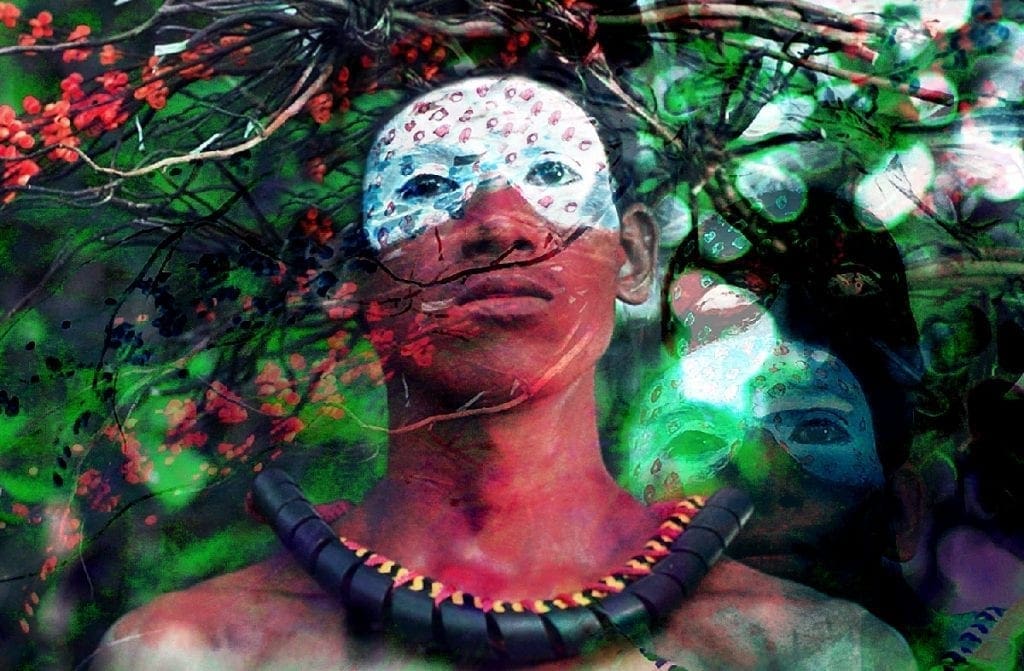Following in the footsteps of pioneers Brô Mc’s, Kunumi MC shouts about the anger of the peoples threatened with genocide by Bolsonaro’s politics.
In the video for “Xondaro Ka’aguy Reguá” (the warrior from the forest), released in the spring, Kunumí MC sports the traditional headdresses and body paint inspired by indigenous traditions, as well as futuristic ornaments and virtual reality glasses, swapping between Amazonian landscapes and the urban jungle of São Paulo. Set against Indian flutes and trap basses, the Guarani raps: “There used to be plenty of fruit to eat in the forest / But the white man came and destroyed everything God had created”. In 2020, the destructive white man is embodied by Jair Bolsonaro. Since his inauguration on 1 January 2019, the Brazilian president has pursued a policy that the indigenous peoples, and their champions, describe as “genocide, ethnocide and ecocide”. Not only does he want their lands to be opened up to the agricultural industry, mining and oil exploration, and hydroelectric dams, his declarations give free rein to wild deforestation and the abuses of illegal goldmining – the murdered caciques (chiefs) no longer come into it. Similarly, since the health crisis exploded, he has shown no concern for the fate of these particularly vulnerable populations, of which several thousand members have contracted Covid-19, with several hundred dying from it.
Kunumí MC - Xondaro Ka’aguy Reguá
Werá Jeguaka Mirim by his real name, Kunumí MC his only 19 (“kunumí” means “young man” in Guarani). He was born and lives in Krukutu, a community of 250 inhabitants, surrounded by nature on the fringes of the megalopolis São Paulo. It was there that he attended school and shaped his political consciousness, with the help of his parents – his father Olívio Jekupé was one of the first indigenous writers to be published – and television, echoing the struggles being waged across the country. As a teenager, he took on this fight in the middle of the opening ceremony of the 2014 FIFA World Cup: recruited to release a dove as a symbol of peace in the stadium, he deviated from protocol to display a banner showing the word “Demarcação” – the demarcation of the lands of indigenous peoples, acquired in the constitution of 1988 and often challenged, by Bolsonaro in particular. “That day I realised what my mission would be: fighting for my people”, says the young man. But he still had to find a medium: “I chose rap because it’s like poetry”, he explains, emphasising the profound influence of Brô MC’s, Brazil’s first indigenous rap group – Kunumí MC is the first solo rapper.
Brô MC’s - Retomada
Formed in 2009 in Mato Grosso do Sul, Brô MC’s (from the Guarani-Kaiowá people) paved the way for indigenous rap. Its artists – including a strong female representation – currently go by Brisa Flow (Mapuche), Katú (Bororos), Oz Guarani (Guarani), Wescritor (Tupinambá de Olivença) and Kaê Guajajara (Guajajara)… Whether they live in rural areas or in cities, the diversity of their codes and expressions overturns the stereotypes they have been saddled with. But they all produce lyrics that are fiercely committed to denouncing the globalised political, social, economic, ecological and health crises, from which their communities are suffering on the front line. They are “warriors”, a state inherent to the indigenous condition, according to Kunumí MC: “We must always fight for our land, for our habitats, to preserve nature and the planet. Today, as in the past, we won’t allow ourselves to be enslaved”, he promises, signalling back to the ravages of colonisation: “Bolsonaro is the worst heir to this story, but it could get even worse if we don’t do anything. We need to remember the military dictatorship (1964-1985) during which many indigenous and non-indigenous people were murdered”.
Brisa Flow - Fique Viva
Anointed by the Brazilian rap star Criolo (they recorded the duet “Terra, ar, mar”), Kunumí MC believes artists can be a vehicle for this struggle: “Many of our writers and singers are fighting to raise the profile of our knowledge and culture. And we also have great leaders who struggle relentlessly, speaking at institutions and in the mainstream media, repeating that we need help and won’t stop resisting”.
Katú - Não cansei
His conviction is that new generations are already assuming this determination, through school, an education centre co-founded by his father, and the oral tradition of which rap is a modern version. “Since the 1500s, the indigenous peoples have suffered significant violence, massacres and discrimination”, says the young artist with regret. Now we’re dreaming that things will change, in the future”. The weight of his words and futurism of his videos, like the raps released by Brô MC’s, Brisa Flow and Katú, issue a warning to Bolsonaro, the industrialists and coronavirus that they’re going to come up against warriors.


